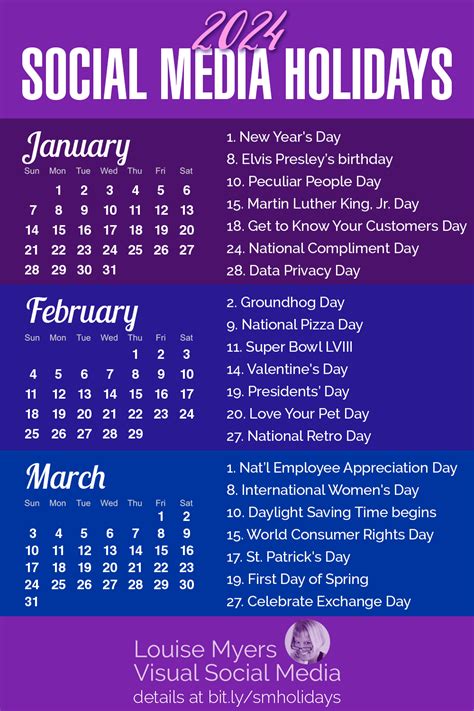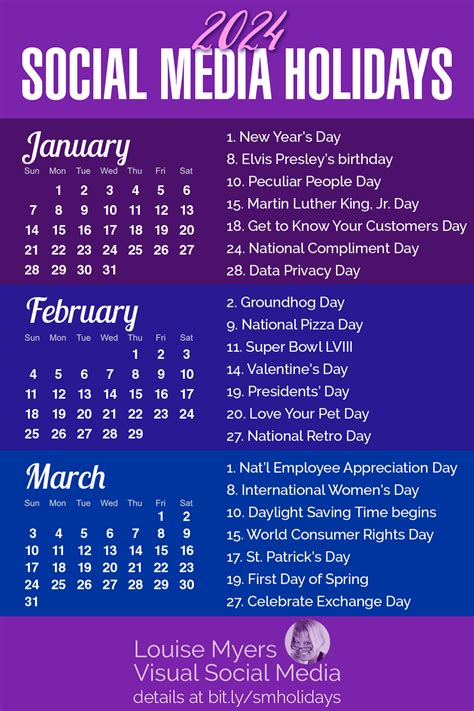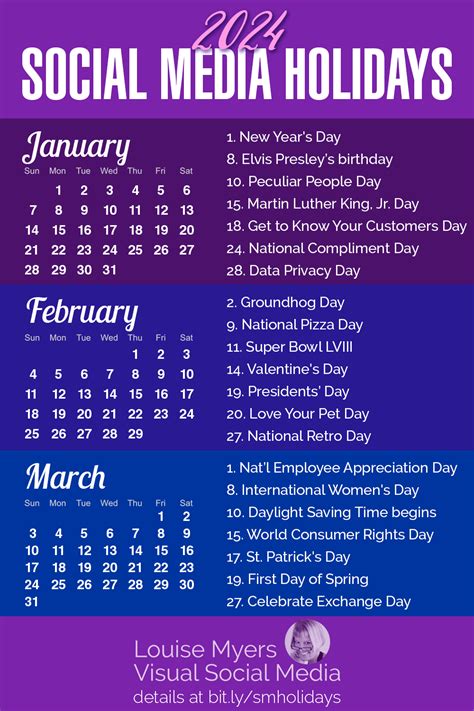Plan your 2024 social media marketing success with this essential holiday calendar. Learn to identify key events, create engaging content, and measure ROI.Welcome to our latest blog post focused on the 2024 social media holiday calendar. As we all know, social media plays a crucial role in any marketing strategy, and keeping up with the ever-changing landscape is essential for success. In this post, we will delve deep into understanding the 2024 social media landscape, identifying key holidays and events to leverage, and developing a content strategy to maximize your marketing efforts. We’ll also explore the importance of implementing engaging marketing campaigns tailored to these holidays and events, and we’ll discuss how to measure success and evaluate ROI. By the end of this post, you’ll have a comprehensive understanding of how to effectively navigate the social media holidays of 2024 and optimize your marketing efforts for maximum impact. Let’s dive in and set the stage for a successful year of social media marketing!
Understanding the 2024 Social Media Landscape
In the fast-paced world of social media, it’s crucial for businesses and marketers to stay updated on the latest trends and changes. Understanding the 2024 social media landscape is essential for staying ahead of the competition and reaching target audiences effectively. With the ever-evolving nature of social media platforms, it’s important to continually adapt and optimize strategies. From emerging platforms to shifting consumer behaviors, there are several key factors to consider when navigating the social media landscape in 2024.
The first step in understanding the 2024 social media landscape is to identify the current leading platforms and their user demographics. Platforms like Facebook, Instagram, Twitter, and LinkedIn continue to dominate the social media space, but new players may emerge in 2024. By analyzing the demographics, user behaviors, and engagement metrics of different platforms, marketers can make informed decisions about where to allocate their resources for maximum impact.
In addition to platform preferences, it’s essential to keep abreast of the latest trends and features on each platform. For example, video content is gaining popularity on social media, with platforms like TikTok and Instagram Reels driving this trend. Understanding how to leverage these features and trends can help marketers connect with their audience in more meaningful and impactful ways.
Furthermore, staying informed about changes in algorithms, ad policies, and privacy regulations is crucial for navigating the 2024 social media landscape. As platforms adapt their algorithms and policies, marketers must adjust their strategies to maintain visibility and compliance. With data privacy becoming an increasingly important concern for consumers, it’s essential to ensure that marketing efforts align with evolving regulations and best practices.
Identifying Key Holidays and Events
When it comes to developing a successful content strategy, it’s essential to identify the key holidays and events that will resonate with your target audience. By recognizing the holidays and events that are significant to your audience, you can create engaging and relevant content that will capture their attention and drive engagement.
One way to identify key holidays and events is to conduct research on the cultural and social significance of various dates. Understanding the historical and cultural context of holidays and events will help you tailor your content to resonate with your audience and show that you understand the values and traditions that are important to them.
Additionally, it’s important to stay aware of industry-specific events and holidays that may be relevant to your audience. For example, if you’re in the retail industry, Black Friday and Cyber Monday are major events that you’ll want to incorporate into your content strategy. By staying informed about industry events, you can ensure that you’re creating content that is timely and relevant to your audience’s needs and interests.
| Holiday/Event | Date |
|---|---|
| New Year’s Day | January 1 |
| Valentine’s Day | February 14 |
| Independence Day | July 4 |
| Halloween | October 31 |
Finally, creating a social media holiday calendar can help you stay organized and plan your content strategy around key holidays and events. This calendar can serve as a visual guide to upcoming dates and allow you to allocate resources and plan your content in advance, ensuring that you have engaging and relevant content ready to go when key dates arrive.
Developing a Content Strategy for Holidays
Once you have identified the key holidays and events for the 2024 social media landscape, it’s crucial to develop a content strategy that will resonate with your target audience. This means understanding the cultural significance of each holiday and event, as well as the type of content that will be most engaging for your audience.
When developing your content strategy, it’s important to consider the platform you will be using. Different social media platforms have different audiences and require different types of content. For example, Instagram may be more visual and lifestyle-focused, while Twitter may be more news-oriented and concise. Tailoring your content to the platform will ensure that it is most effective in reaching and engaging your audience.
Another key aspect of developing a content strategy for holidays is to plan ahead. By creating a content calendar that outlines the type of content you will be posting, as well as the dates and times of posting, you can ensure that your content is timely and relevant to the holiday. This will also help you to stay organized and consistent in your posting, which is essential for building a strong social media presence.
Finally, it’s important to engage with your audience when developing your content strategy. This means listening to their feedback and responding to their comments and messages. By understanding what your audience wants and needs, you can tailor your content to be more engaging and valuable, ultimately leading to a more successful holiday marketing campaign.
Implementing Engaging Marketing Campaigns
When it comes to implementing engaging marketing campaigns, it is important to first identify your target audience and understand their needs and interests. This will allow you to create content that resonates with them and ultimately drives engagement. Utilizing compelling visuals, such as high-quality images and videos, can capture the attention of your audience and encourage them to interact with your brand.
Furthermore, incorporating interactive elements into your campaigns, such as polls, surveys, and contests, can encourage participation and create a sense of excitement among your audience. By providing valuable and relevant content, you can establish your brand as an authority in your industry and build trust with your audience, ultimately leading to increased engagement and loyalty.
Another crucial aspect of implementing engaging marketing campaigns is leveraging the power of social media. Sharing user-generated content, responding to comments and messages, and utilizing popular hashtags can help your brand to connect with your audience on a more personal level. Additionally, utilizing social media advertising and influencer collaborations can extend the reach of your campaigns and attract new followers and potential customers.
In conclusion, implementing engaging marketing campaigns requires thoughtful planning, creativity, and a deep understanding of your target audience. By creating compelling content, leveraging interactive elements, and harnessing the power of social media, you can effectively engage your audience and drive meaningful results for your brand.
Measuring Success and Evaluating ROI
When it comes to measuring success and evaluating ROI for your marketing campaigns, it’s important to have a clear understanding of your goals and key performance indicators (KPIs). Whether you’re looking to increase brand awareness, drive sales, or generate leads, it’s essential to establish metrics that will allow you to track your progress and determine the effectiveness of your efforts.
One of the most common ways to measure success is through website analytics. By tracking metrics such as website traffic, bounce rate, and conversion rate, you can gain valuable insights into the performance of your marketing campaigns. Additionally, social media analytics can provide important data on engagement, reach, and audience demographics, helping you to understand the impact of your social media efforts.
In terms of evaluating ROI, it’s important to consider both the financial and non-financial returns on your investment. While it’s relatively straightforward to calculate the monetary return on a marketing campaign, it’s also important to consider the broader impact on brand perception, customer loyalty, and long-term value. By taking a holistic approach to evaluating ROI, you can gain a more complete understanding of the success of your marketing efforts.
Ultimately, measuring success and evaluating ROI is a critical aspect of effective marketing. By setting clear goals, identifying key metrics, and taking a comprehensive approach to evaluation, you can ensure that your marketing efforts are delivering a tangible return on investment.
Frequently Asked Questions
What is the importance of having a social media holiday calendar?
A social media holiday calendar helps businesses plan and strategize their marketing efforts around key dates and events that are relevant to their target audience.
How can a business benefit from using a social media holiday calendar?
Using a social media holiday calendar can help businesses stay organized, create relevant and timely content, engage with their audience, and drive sales during important dates and holidays.
What are some essential dates to include in a social media holiday calendar?
Essential dates to include in a social media holiday calendar may include traditional holidays such as Christmas and New Year’s, as well as unofficial holidays like National Coffee Day or International Women’s Day.
How should businesses prepare for social media holidays in advance?
Businesses should research upcoming holidays, create content in advance, and schedule posts to ensure a consistent and timely presence on social media during these holidays.
What are some tips for creating engaging content for social media holidays?
Some tips for creating engaging content for social media holidays include using relevant hashtags, creating visually appealing graphics or videos, running contests or promotions, and leveraging user-generated content.
How can businesses measure the success of their social media holiday campaigns?
Businesses can measure the success of their social media holiday campaigns by tracking metrics such as engagement, reach, clicks, conversions, and sales during the holiday period.
Where can businesses find a comprehensive 2024 social media holiday calendar?
Businesses can find a comprehensive 2024 social media holiday calendar from reputable marketing websites, social media management platforms, or by creating their own based on their target audience and industry.



